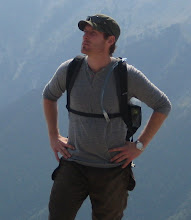Interesting linguistic story: I’d just arrived in Belgrade, on the second to last day of a fourteen day trip through the Balkans. It was 5:00am. I’d slept about three hours on the bus ride from Sarajevo. I was slightly—only slightly—nervous about being dumped off at a sketchy looking bus station in a city I was wholly unfamiliar with. And I have to say, after the unflattering stories I’d heard in Croatia and Bosnia about the Serbs—they were, according to one Croat, “primitive animals,”—and considering the permanent scars left on nearly every Sarajevan building by the heavy hand of the Army of Republika Srpska, I was expecting some sort of unprovoked altercation.
I'll tell you now that nothing dramatic happened. But for a linguist, I did discover something intriguing. I wandered back and forth in front of the bus station, map in hand, trying to get my bearings straight. I wanted to find the train station to get my ticket to Budapest that night, and I wasn’t about to ask. I typically don’t ask for directions, not out of pride, but rather out of the challenge afforded me by finding my way around a new city. But then again, even a minute of conversation about the whereabouts of the train station can reveal quite a lot about the local psyche. So I decided after a few to ask a friendly looking taxi driver washing his cab on the street corner.
I opened my Lonely Planet and looked under the Bosnian/Croatian/Serbian section for the word for train. Vlak. Got it.
“Excuse me,” I said mustering as much geniality as was possible for five in the morning. “Do you know where the vlak is? Vlak station? Vlak?”
I always find it ridiculous when we try to communicate with those we assume don’t speak our language. We typically begin with a syntactically perfect sentence, and then, upon realizing we are not understood, we begin to speak as if our fellow interlocutor is either retarded or deaf. The funny thing is that we look more retarded to him than we think. Imagine someone coming up to you to say, “Blah blah. Blah blah blah blah blah train blah blah?” Train blahblah? Train?” It’s no wonder the world is at war.
The cabbie leaned forward slightly, as if inspecting a crumb on my lips or a scar on my cheek, and said in perfect English, “Excuse me. Do you speak Serbian?”
“No,” I said a little confused. “I speak English.”
The cabbie then turned his palms up, lifted his hands with a jerk, and shrugged his shoulders once. He cocked his head and pouted his lips slightly in a perfect expression of complete apathy. He turned around and continued to wash his taxi.
I stood for a moment, mystified. I wanted to say something insulting, but this was not my land, and nothing clever came to mind.
“Thanks buddy. Have a great day,” I mumbled as I turned and walked away.
A while later I was sitting in a café reading my Lonely Planet. I was still slightly disturbed at my mistreatment at the hands of this surly Serb. I flipped to the language section of the book, explaining all the useful idioms and phrases of the Balkans. I looked again under the Bosnian/Croatian/Serbian section.
train
vlak (C)/voz (B&S) воз
That (C) stands for Croatian. The (B&S), Bosnian and Serbian. Reminder: this was the Balkans. A lesson I never thought I’d have to consider: you just can’t go around using words willy nilly as if they’re not going to conjure up things like, oh I don’t know, hatred, war, genocide, and massive forced expatriation.
Who would have thunk it!
Monday, February 23, 2009
Subscribe to:
Post Comments (Atom)

No comments:
Post a Comment